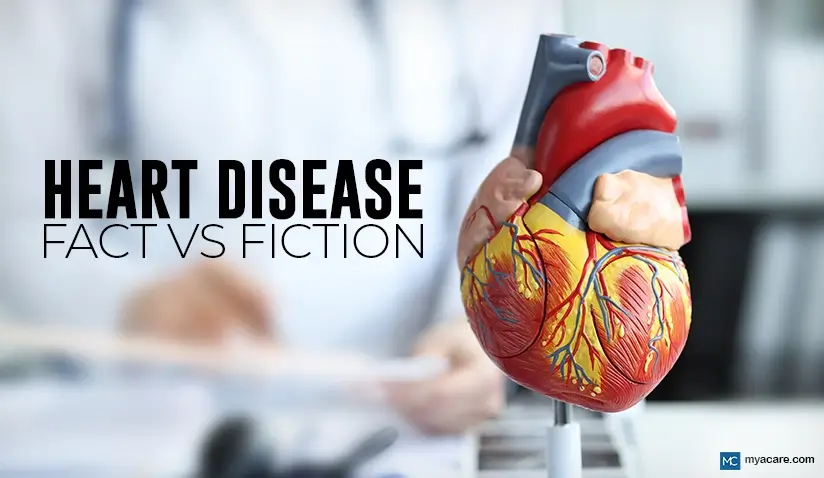Heart Disease – Fact vs. Fiction

World Heart Day is the world’s biggest platform for raising awareness about cardiovascular disease, including heart disease and stroke.
According to the World Heart Federation, cardiovascular disease is one of the leading causes of death and disability across the world, killing 17.5 million a year. This accounts for the third leading cause of death worldwide and half of all non-communicable disease-related deaths.
In this article, we look at some of the common myths regarding heart disease, and some practical steps you can take to improve your heart health.
Common Cardiovascular Diseases
One misunderstanding about cardiovascular disease is that it is only one disease. In reality, there are many diseases that fall into this category. According to Mayo Clinic, heart diseases may consist of coronary artery disease, arrhythmias, congenital heart defects, and conditions that relate to narrowed or blocked blood vessels and other conditions that involve irregularities in the heart's muscle, valves, or rhythm. As claimed by the American Heart Association, heart disease can lead to a number of additional health issues, some of which include myocardial infarction (heart attack), ischemic attack (the most common type of stroke), heart failure, hemorrhagic attack (a less common, but sometimes more serious type of stroke), and more.
Common Myths
As stated by Harvard Health Publishing, some common myths about heart disease are as follows:
- Cardiovascular disease sufferers need to take it easy
- As long as a cholesterol-lowering drug is being utilized, sufferers can eat anything they want
- It's normal to have higher blood pressure at an older age
- Diabetes cannot cause cardiovascular disease if a diabetes medication is being taken
- Vitamins and supplements are acceptable ways to lower the risk for heart disease
- Chronic smokers can reduce their risk of cardiovascular disease the moment they quit smoking.
- Heart diseases mostly affect men
- Sufferers should eat as little fat as possible
- A small heart attack is nothing to worry about
All of these statements are false and should be further researched by heart disease sufferers to gain a better understanding of how and why.
Genetics
One common misconception regarding heart disease is that it is strictly hereditary. Although cardiovascular diseases can leave a person predisposed, it does not guarantee nor exclude the chances of an individual acquiring the ailment. Risk factors for heart disease can be majorly influenced by lifestyle choices, regardless of genetics.
Age
Although heart disease is generally more prevalent in older adults, anyone of any age can suffer from cardiovascular diseases. When the blood vessels in the heart get clogged with plaque, it makes it more difficult for blood to circulate to the rest of the body, including the legs. This often causes pain due to the type of heart disease, which often leads to heart attacks. Leg pain can be a sign that one may be suffering from cardiovascular disease and potentially lead up to a heart attack.
Gender
Many believe that men and women have the same symptoms when it comes to heart attacks and in some instances, it is true, but not always. In a study, WebMD found that both men and women reported symptoms of pain, shortness of breath, and fatigue, but men were more likely to experience right-side chest discomfort, dull ache, discomfort, and indigestion. Women, on the other hand, were more likely to experience throat discomfort, pressing on the chest, and vomiting.
According to the American Heart Association, high blood pressure does not clearly display any signs or symptoms and must be routinely monitored in order to be kept under control.
Diet
It is commonly believed that fats are bad for your health and should be avoided; this is not necessarily true, as there are good and bad types of fat and both are a dietary necessity, in proportion. As with fats, there are good and bad types of cholesterol and once the good kind (High-density lipoprotein) is elevated, it allows the bad kind (Low-density lipoprotein) to be decreased.
LDL cholesterol levels can be lowered through an appropriate diet with increased amounts of whole grains, beans, nuts, citrus fruits, and many other foods. Superfoods that have been proven to help prevent heart diseases are beans, berries, dark greens, nuts, seeds, oats, salmon, and other foods that contain good fats.
Ways to improve heart health
Eat Better
The food that we eat has a direct connection with our heart. For instance, if you drink caffeine, the heart speeds up. And, if we eat too many saturated fats, our heart ends up being encased in fat. Obesity is the leading cause of heart disease, followed by high blood pressure and diabetes.
There are various heart healthy diets that you can research. For example, the Mediterranean diet is immensely popular globally when it comes to heart health. Its beneficial effect on heart health deserves the hype. According to the research in Nutrition Journal, the Mediterranean diet plays a major role in managing and balancing the levels of fat in the blood.
Stop Smoking
Both smoking and exposure to secondhand smoke is harmful to your heart’s health. The nicotine from cigarettes causes your blood vessels to contract, but it also boosts up your blood pressure. This, in turn, can become the leading cause of cardiovascular disease. It also increases the risk of metabolic syndrome.
Metabolic syndrome is an amalgamation of many risk factors that increase the possibility of heart disease. These risk factors include diabetes or stroke. In accordance with a recent study on Diabetology and Metabolic Syndrome, it was found that inflammation increased due to smoking; thus, in turn, increasing the risk of heart diseases.
Move More
Rapid urbanization and hectic work schedules means people are much more inactive than they were in the past. People generally move less than they used to. Even taking small steps such as walking for 30 mins a day can help improve heart health.
Above all, in order to sustain good cardiovascular health and healthy life, consider diet, lifestyle and the surrounding environment. Don’t be negligent, make sure to give your heart the care it deserves. Few simple lifestyle changes such as eating healthy food, being more active and quitting smoking can improve heart health as well as overall well being.

Sana Hospital Group is one of the largest independent healthcare providers in Germany. With over 50 world-class hospitals and more than 2 million patients yearly, Sana operates leading facilities, among them university hospitals, tertiary care centers, and specialized hospitals to deliver a broad portfolio of top-tier medical care. Whether it is preventive health care, an acute or chronic illness, a planned procedure, or a long-term diagnosis - more than 600 chief physicians, 4,500 medical professionals, and 11,000 nursing staff provide excellent treatment options, world-class medicine, and the best possible medical care.
Sources:
Featured Blogs



